Dakar Rally: Sam Sunderland on pasta at 3am, dodging cows & the secret route
- Published
- comments
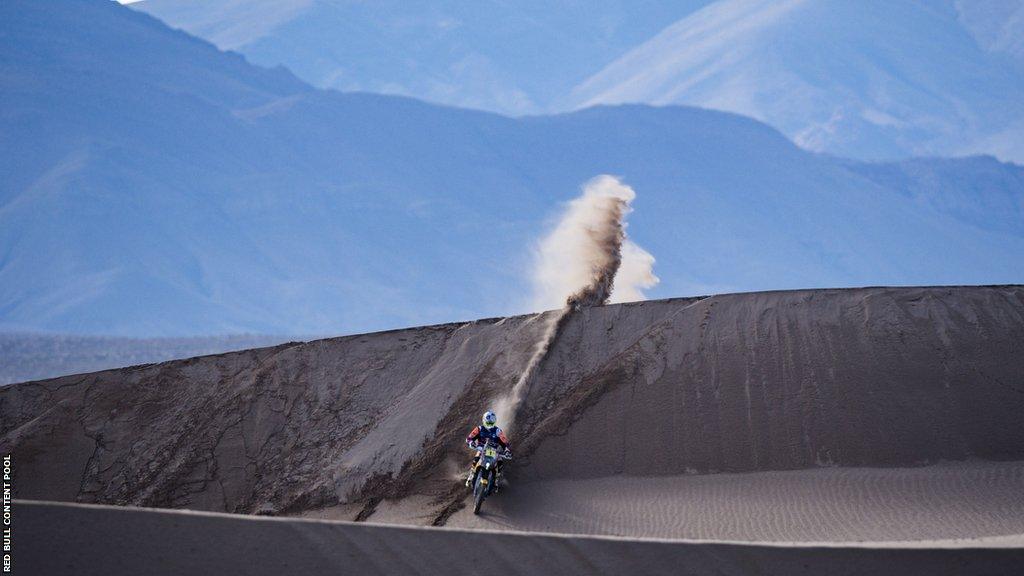
Sam Sunderland's total race time was 32 hours, six minutes and 22 seconds
Sixteen months ago Sam Sunderland was lying in a hospital bed in the Moroccan desert, facing an operation that would leave him with one leg 2cm shorter than the other and a severe case of self doubt.
Now he finds himself as the first British winner of the Dakar Rally, a mind-bending, body-crushing trial across three countries that is part sporting spectacle, part endurance event.
Sunderland, 27, had never finished the race before this year but after 12 days and just under 5,500 miles in the deserts, mountains and riverbeds of Paraguay, Bolivia and Argentina he emerged as winner of the motorbike category.
So how did he do it?
Don't get injured
If your day job is riding a motorbike at speeds of up to 120mph in sand dunes, gravel tracks and riverbeds then falling off and suffering injuries are occupational hazards.
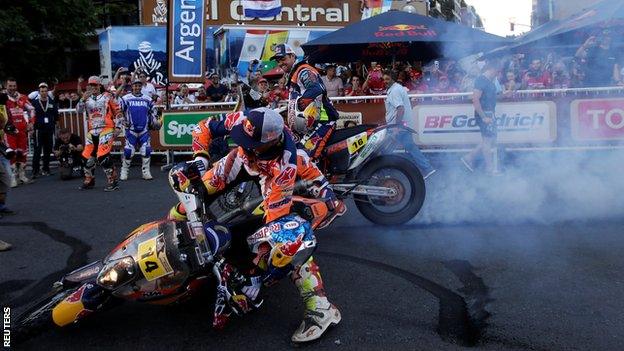
The only time Sunderland fell off his bike was while celebrating his win
Sunderland broke his femur in a training crash at the end of 2015 and has also broken both wrists in the past - but managed to restrict his only fall at this year's Dakar to a spill at a standstill while performing a celebratory burnout after crossing the finishing line.
"Three days after winning the Morocco rally in 2015, which was the highlight of my career, I broke my leg in a real hero to zero job," Sunderland said.
"It was a rough time and a long 45-minute wait for a helicopter to come and take me away when I was lying there with my leg bent in half. The desert is not where you want major surgery and it was heavy for the mind. You think to yourself 'what am I doing to myself?'
"But I was lucky, and it's part of our sport. Motorsport can be dangerous but that is why it's so exciting and so serious. You need to stay focussed on the job."
Just 97 of the 142 bikes which entered the rally finished in Buenos Aires, with Australian Toby Price, the 2016 winner, perhaps the most notable retirement.
Like Sunderland in Morocco, Price broke his femur, external in a crash during stage four in Bolivia.
"There is massive camaraderie between the riders," says Sunderland.
"We are all professionals and race for different teams but if you are being arrogant to another rider, you have to think that he could be the guy to save your life if he comes across you when you've had a crash.
"A lot of people have lost their lives in the Dakar. It's not a nice statistic but it's part of the crazy adventure."
A total of 28 competitors have died competing in the rally since it began in 1979.
Don't get lost
The Dakar Rally sees competitors spending up to 15 hours a day in the saddle, alone with no communication to their team except at refuelling points and with no sat-nav to guide them.
The route is kept secret, with riders only being handed the next day's stage the evening before. It's not just a straight race to the finish - navigation is a major part of the challenge.
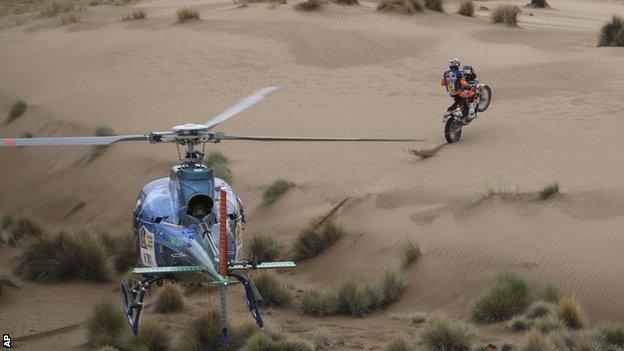
In 2015 Sunderland made a navigational error and eventually had to retire with dehydration
Riders live and die by their road books - a scroll of up to 600 notes per day which is turned from a switch on the handlebars and guides them to the finish of each day's stage.
"It's never the smartest idea to take your eyes off the road, so you have to time when to look at the road book just right," Sunderland says.
"The course is not marked at all, nothing. You can easily get lost.
"Sometimes you think you are going the right way but you only know for sure if your notes match up with the next point. If it says, for example, exit the riverbed on a track on the left and there isn't a track there, the panic starts to rise.
"You can be the fastest guy in the world but if you're going the wrong way it means nothing."
Sunderland did get lost on stage 10 of the rally and lost time to his rivals but managed to retain his overall lead.
Don't neglect your diet
Pasta at 3am. The breakfast of champions. Well, of this particular champion anyway.
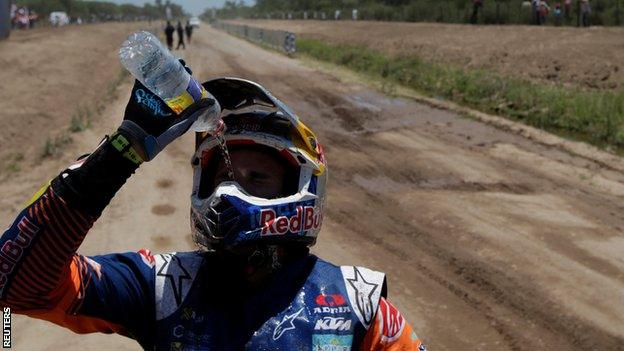
Sunderland suffered with hyponatremia when training in Dubai - caused by drinking too much water
Sunderland lost 7kg during this year's edition, despite meticulous plans made to refuel his own body correctly during the punishing race which sees bikers compete at temperatures ranging from 2C in the middle of the night to 45C in the Argentine afternoon.
A bowl of cold pasta moments after waking up might not be everyone's idea of starting the day well, but competitors find it difficult to take enough calories on board.
"It's hard to explain how physically demanding it is," Sunderland added.
"Pasta at 3am is just the start of it. I have a hydration pack on my back which has electrolytes and carbohydrates in it, and I have another packet which has a liquid meal inside.
"When it's 45C it doesn't taste too good - it's like chocolate tea - but you have to get it done. I've experienced and tried a lot of things. This year I ended up using a shake they give to cancer patients in hospital."
Don't get hit by lightning. Or a cow
Just finishing each day without falling off, damaging yourself or your bike, and without getting lost is tough enough without the natural hazards that South America can throw up.
"On day one there were lots of cows on the route," says Sunderland. "I had a few hairy moments. I must have been riding at about 100mph when a cow went from bush to bush right in front of me.
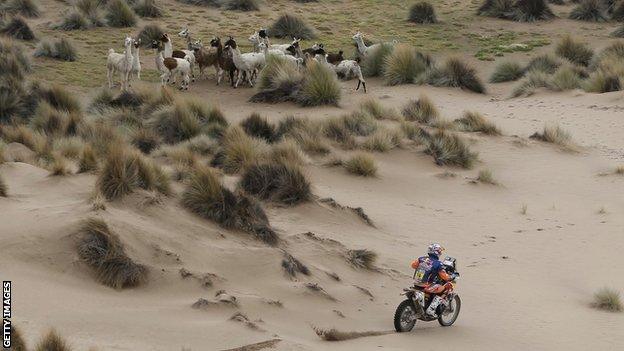
Confusingly, the Dakar Rally no longer goes to Dakar, Senegal, at all. The race relocated to South America in 2009
"I didn't have time to do anything - it was just dumb luck that I missed it. At that speed, by the time you see it you are past it.
"In Bolivia there were lots of llamas and rheas, which are a bit like emus. But I managed to avoid them all."
Slovakian rider Ivan Jakes took a close encounter with nature a step further when he was struck by lightning, external - but still managed to finish that day's stage.
"The day after that I was on a road section and it was raining like crazy, slapping down on my lips and arms, freezing cold," Sunderland said.
"I could see that we were riding towards a storm and there was a lot of lightning. I had never been scared of being struck by lightning in my life, it's unheard of, but like if you are swimming in the ocean and someone mentions sharks, all of a sudden that's all you can think about."
Don't give up
Sunderland's previous attempts at the Dakar had ended in an engine failure and then a severe case of dehydration that left him unable to see.
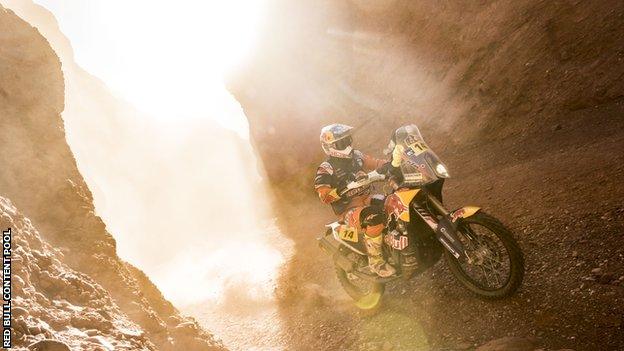
Sunderland slept inside an altitude tent at his home in Dubai to prepare for racing in Bolivia
His outlook at the start of the 2017 race was to concentrate on the old adage 'in order to finish first, first you must finish'.
And, despite nearly falling asleep on the bike during a 4am road stage, he eventually won the race by 32 minutes from Austrian team-mate Matthias Walkner.
"I've achieved a dream," he said.
"Dakar is a story of determination, not quitting and carrying on through all the tough times. If you want something bad enough you find a way.
"To get to the top you've got to be all in, there's no half measures."
- Published26 February 2019
